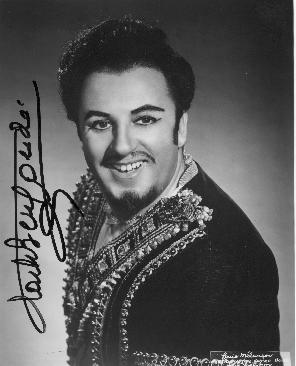Carlo Bergonzi
Review of the "Le Concert des Nations" in Paris published by Opéra 64, May issue 1964, by Clym
During his vocal studies in Parma, Bergonzi was imprisoned because he was an antifascist; then he was
sent to the front, got into a German Forced Labor Camp, and could finish his studies only after WWII. He made his debut,
still a baritone, in 1947. After three years, he decided to restudy as a tenor.
His second debut took place at the Petruzzelli in Bari in 1951, as Andrea Chénier. Very soon, he was hired by the
Italian radio RAI, where he was a huge success. On stage, he made his debuts in Naples, Rome and in 1953 at La Scala (world
premiere of Jacopo Napoli's opera Mas'aniello on 25 March, Bergonzi in the title role). In 1955, he was already in London and
Chicago, and in 1956 at the Met, which was to be at the center of his career: he sang there regularly from 1956 to 1988, a
total of 324 performances.
Bergonzi was, almost from the beginning of his tenor career, considered the Verdi expert par excellence; not least, I think,
because the hamlet where he was born is just a stone's throw from Busseto (Verdi's birthplace) and Sant'Agata (Verdi's later
country estate). He recorded at least selections from every Verdi tenor role (and many of them in complete editions).
Already during his career, he opened a hotel in Busseto, called "I due Foscari", where he actually worked in his later years.
After 1993, he appeared only occasionally in concert; but one Verdi role that he had never sung live was Otello, and he
absolutely wanted to do it. The Carnegie Hall concert performance where he would make his Otello debut in 2000 (!) was a huge
event; even Domingo, Pavarotti and Carreras, all three of them, were in the audience. It was a failure; Bergonzi had to
bow out after act 2.
I saw Bergonzi, beyond his stage and concert performances, twice in public interviews, and found him incredibly conceited;
although he is said to have been very nice and helpful with younger colleagues. As far as his singing, it's true that in
comparison with most of his contemporaries, he must appear as a noble, refined stylist; but that's more because of his
contemporaries than because of himself. For example, his legato is insufficient, and far from stylish singing. Also,
what appears as nobility to many, may also be seen, or heard, as a sore lack of passion (not always, but almost always). And
his top range betrays (again, not always, but almost always) his baritone origins: it's labored, uneasy, pushed. To sum it
up, Bergonzi is a singer that I only very rarely, and reluctantly, listen to, although I readily admit that some (some!) of
his countless recordings are fantastic.
Reference 1, reference 2: Kutsch & Riemens, reference 3, reference 4, reference 5: Die Welt, 27 July 2014
La bohème (Schaunard) – Catania, Arena Argentina, 7 August 1947 Il barbiere di Siviglia (Figaro) – Lecce Madama Butterfly (Sharpless) Andrea Chénier – Bari, Petruzzelli, 18 January 1951 Giovanna d'Arco – Milano, RAI, 26 May 1951 Pagliacci – Milano, RAI, 10 June 1951 La forza del destino – Milano, RAI, 16 July 1951 Un ballo in maschera – Milano, Nuovo, 15 August 1951 Simon Boccanegra – Roma, RAI, 21 November 1951 I due Foscari – Milano, RAI, 5 December 1951 Adriana Lecouvreur – Prato, Metastasio, 31 December 1951 Faust – Bari, Petruzzelli, 8 January 1952 Její pastorkyňa (Jenůfa) (Števa) – Roma, Opera, 17 April 1952 Ifigenia – Napoli, San Carlo, 1 June 1952 Mefistofele – Roma, Caracalla, 1 July 1952 Madama Butterfly – Cagliari, All'aperto, August 1952 Masaniello – Milano, Scala, 25 March 1953 Rigoletto – Livorno, Goldoni, 20 May 1953 Aida – Buenos Aires, Colón, 24 July 1953 Tosca – Buenos Aires, Colón, 7 August 1953 Manon Lescaut – Rovigo, Sociale, 24 October 1953 Turandot – Catania, Massimo Bellini, 19 November 1953 Loreley – Reggio Emilia, Municipale, 2 February 1954 L'incorazione di Poppea – Milano, RAI, 7 March 1954 Carmen – Monte Carlo, Salle Garnier, 30 January 1955 Lucia di Lammermoor – Brescia, Grande, 3 Fenruary 1955 Don Carlo – Buenos Aires, Colón, August 1955 La traviata – Salsomaggiore, Nuovo, 10 September 1955 Il tabarro – Chicago, Lyric, 16 November 1955 Cavalleria rusticana – Chicago Lyric, 26 November 1955 L'amore dei tre re – Chicago, Lyric, 28 November 1955 La Gioconda – Trieste, Castello di San Giusto, 16 July 1956 Il trovatore – New York, Met, 13 November 1956 Fior di Maria – Milano, RAI, 30 January 1957 La bohème – Caracas, Municipal, October 1957 Macbeth – New York, Met, 5 February 1959 L'elisir d'amore – San Sebastian, Victoria Eugenia, 26 August 1959 Ernani – New York, Met, 26 November 1962 La Wally – New York, Carnegie Hall, 13 March 1968 Werther – Napoli, San Carlo, 11 February 1969 Norma – New York, Met, 3 March 1970 Luisa Miller – Genova, Margherita, 20 September 1972 Edgar – New York, Carnegie Hall, 13 April 1977 I lombardi alla prima crociata – San Diego, Russ Auditorium, 22 June 1979 Il corsaro – New York, Town Hall, 16 December 1981 Attila – Tulsa, Chapman Music Hall, 6 March 1982 Otello – New York, Carnegie Hall, 3 May 2000 Reference: Gustavo Marchesi, Carlo Bergonzi, I suoi personaggi; Azzali Editori, Parma, 2003 This book barely mentions Bergonzi's baritone roles. It gives the wrong year and city (with no mention of the work) for Bergonzi's debut. I want to thank Larry Lustig for giving me the correct date. The book lists as part of Bergonzi's baritone repertory: Don Pasquale, La bohème, Lucia di Lammermoor, and La traviata, without indication of dates, roles or places.
Bergonzi's website lists:
I would like to thank Thomas Silverbörg for the recordings. |
